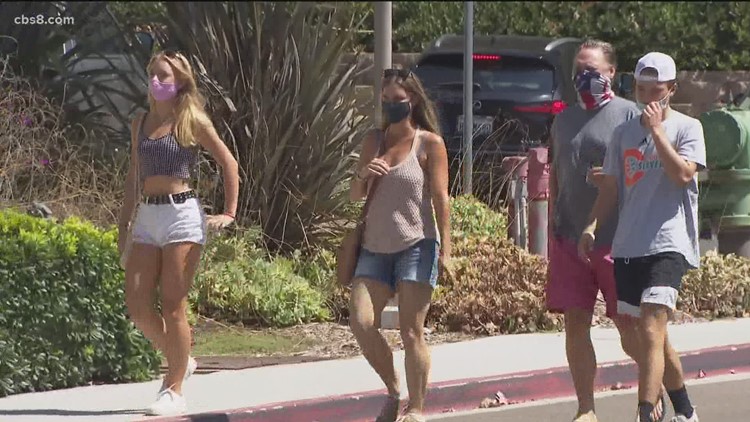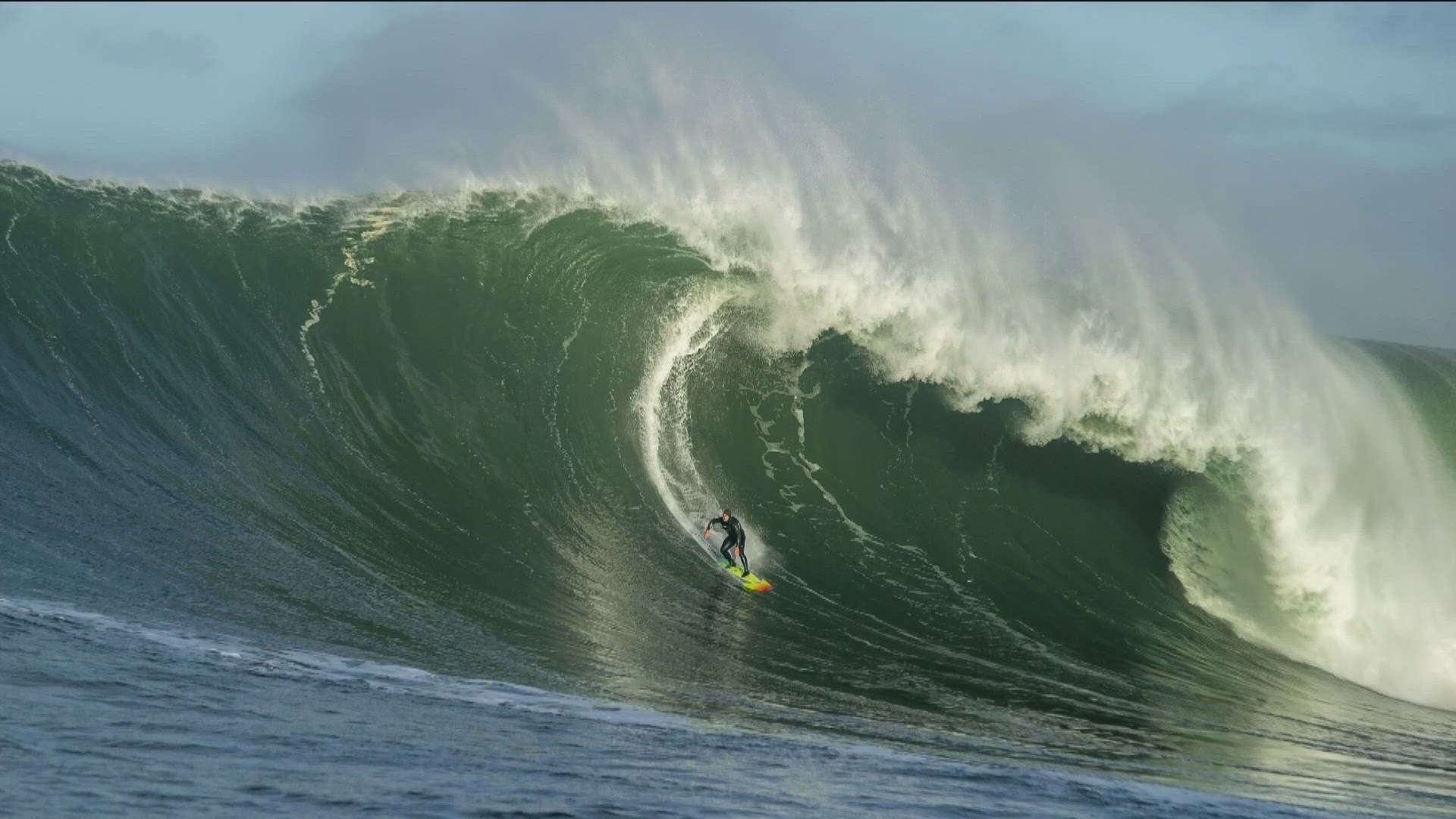SAN DIEGO COUNTY, Calif. — As California recovers from its deadliest surge of coronavirus since the COVID-19 virus first originated more than a year ago, hundreds of thousands of people now find themselves navigating yet another term of education during a global health crisis.
There are a few universities right here in San Diego County that showcase diverse reopening plans for bringing students to some sense of normalcy.
From tents retrofitted for outdoor learning to hosting a county vaccination super center on its campus, there’s a lot to observe from local college communities.
There’s also new information unfolding every day with these universities, so let’s get into what's happened so far this semester.
Vaccines come home to San Diego State and so do the parties
After a request from the state of California, 300 vaccine doses from Moderna arrived at the campus of San Diego State this week.
The university announced the vaccines are being distributed to those who are eligible based on California’s vaccination plan — meaning faculty, staff and other SDSU community members over the age of 65 should have received an email confirming their eligibility and vaccinations started on February 4 at Calpulli Center.
Meantime, around 1,700 students returned to live on-campus at SDSU in January. Shortly after, complaints came to News 8 about large parties returning to the College Area.
Neighbors pointed out multiple parties on Saturday, January 30. One neighbor reported a party that started at eight in the morning to the SDSU Housing department on February 5, and another on January 30 starting around two in the afternoon.
“I felt thumping of the music and hear the screaming and yelling of at least a hundred SDSU students coming from a party that is quite a distance away,” the email stated.
“This has been going on for several months and it is only getting worse, NOT better.”
When News 8 crews walked through the College Area on January 30, around one hundred students were counted walking on Remington Road, 55th Street, the corner of College and Montezuma and walking on Hewlett Drive.
About a dozen students were seen entering 5505 Lindo Paseo, the former house belonging to the now-suspended Theta Chi fraternity.
The logo for Kappa Sigma was seen on the front of the building, where the Theta Chi name used to be.
Kappa Sigma was suspended from SDSU in May 2020. An email attributed to the university stated that while Kappa Sigma can’t become a registered student organization, the fraternity is still operating with recognition from the international board. 5505 Lindo Paseo is not technically owned by the university and therefore not part of the campus.
“The university has received reports of alleged non-compliance and have shared information with appropriate entities,” the email states.
SDSU confirmed in the email on Thursday saying that Elite Security, a company that patrolled the College Area for parties during the Fall 2019 semester, has returned for the first few weeks of this semester.
The email states Elite Security will continue patrols until mid-February when SDSU’s own Community Liaison and Restorative Justice officers will start their enforcement efforts.
On the education front, 123 courses are being offered for in-person instruction this semester with 231 total sections to offer proper social distancing, according to the university.
The university is delaying the in-person meetings for these courses for now until March 1 due to the severity of the pandemic in San Diego County.
UC San Diego’s plans big vaccine rollout while outdoor classrooms weather their first test
UC San Diego was up there with the County and the San Diego Padres to put together one of the state’s first vaccination super stations.
In the heart of downtown at Petco Park, more than 100,000 people have been given a COVID-19 vaccination since the site opened on January 11.
Now, UCSD is looking to open its very own vaccination super site on Monday, February 8 at its recreation center. It has a target of administering 5,000 doses of vaccine a day, but according to an email from Senior Communications and Media Relations Manager at UC San Diego Health Yadira Galindo, that number will fluctuate based on the vaccine supply chain.
“We anticipate beginning inoculations at 1,000 persons per day at RIMAC, growing that number to our target as doses become more abundant and readily available,” the email states.
The university plans on using this site to vaccinate UCSD Health patients and UCSD faculty and staff who are eligible for the vaccine. The site opens on February 8 and the hours are 7 a.m. to 7 p.m., seven days a week.
That vaccination site might help when younger people qualify for the vaccine as UCSD is recovering from a spike in student cases from the beginning of the term. 245 students tested positive for the virus between January 4 and January 16. 61 employees also tested positive during that time.
The university attributed the surge to the number of community members returning to the San Diego area following the winter break.
Since then, 29 students, both on and off-campus, have tested positive for the virus. A relatively low case count compared to the beginning of the year.
UC San Diego has taken efforts to get students back into the classroom to a whole new level. Since last quarter, large outdoor tents have popped up around campus, hosting hundreds of students to learn among their peers.
San Diego is famous for its paradisiacal climate, which makes it a perfect setting for outdoor tents. It is winter quarter, however, and the rains do eventually come.
An abnormally strong winter storm struck San Diego County the last week of January. The weather was so bad, that classes were canceled for outdoor tents on Monday, January 25 and Friday, January 29.
Christine Clark, assistant communications director with UCSD, confirmed in an email that class was canceled for the whole day on those days, but no damages were done to the outdoor classrooms.
County sets up shop at Cal State San Marcos as students move to campus
San Diego County’s ambitious vaccination plan includes four vaccination super centers in every corner of the county.
The third one to open services in North County and opened at the Sports Center at CSU San Marcos on January 30.
The site is open from Sunday through Thursday and has started vaccinating around one thousand people a day. According to the university, they hope to vaccinate 5,000 a day when more vaccines become available.
Though the super center is running out of the CSU campus, it’s run completely by the county without non-medical volunteers from the college community, according to an email sent by CSUSM Communications Specialist Brian Hiro.
Since classes started on January 25, 10 people associated with the campus have tested positive for the virus. According to Hiro, two were employees and eight were students.
Several of these were on-campus cases including someone from the School of Nursing, an employee who works on campus and others who were in campus housing.
265 students are living on-campus at the college this semester and about 164 classes are being hosted in-person — that’s seven percent of the total courses offered at CSUSM.
Dozens of students living on-campus test positive at University of San Diego
University of San Diego is reporting 141 cases of coronavirus from the last two weeks.
Classes at the university started on Monday, January 25 with around 1,080 students living on-campus. This is a significant increase from the 650 students who lived on campus the last term.
USD says less than one percent of students were testing positive last semester but the university is seeing a larger spike in the first two weeks.
48 of the recent cases come from students living in residential housing while 89 come from students living off-campus.
Two come from employees working on campus while another two come from employees working remotely.
USD didn’t directly respond to the specific increase in cases, but did say in an email their safety measures in reopening this semester did accommodate “the potential for a spike in cases at the onset of the semester.”
Students who live in residential housing are required to get tested once per week during the first three weeks of the semester and then every other week for the remainder of the term.



